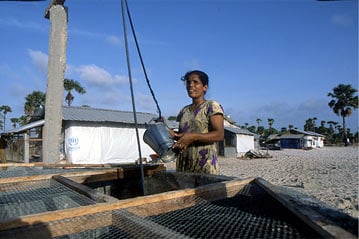UNHCR steps up response to Asian tsunami catastrophe
UNHCR steps up response to Asian tsunami catastrophe
29 December 2004
GENEVA - The UN refugee agency is mounting a major response to the catastrophic tsunami and earthquake disaster in the Indonesian province of Aceh, where it is set to airlift emergency shelter supplies for up to 100,000 people.
"Much of Aceh, which was closest to the epicentre of the earthquake, has been levelled and the local population urgently needs shelter and basic living supplies," said UN High Commissioner for Refugees Ruud Lubbers. "UNHCR has a lot of experience in providing emergency shelter and other aid in extremely difficult situations, so we plan to use our expertise to airlift shelter materials as soon as possible to help those who have lost their homes. The numbers and the needs are absolutely staggering."
The refugee agency is working closely with the United Nations country team in Indonesia in a coordinated response to the catastrophe, and a senior UNHCR staff member will be part of a UN assessment mission to Aceh set for Thursday.
According to Indonesian government figures, hundreds of thousands of people have been affected. Communications to some areas of Aceh remain down, and the number of people affected may rise even higher.
UNHCR is planning to airlift some 3,500 lightweight tents from its regional warehouse in Dubai. In addition, 20,000 kitchen sets, plastic sheeting for 20,000 families and 100,000 blankets will be airlifted from the refugee agency's central warehouse in Copenhagen, Denmark. The total value for this first phase of assistance is US $1.8 million. The dates of the airlifts have yet to be confirmed.
An additional 14 UNHCR logistical and field staff will be deployed to help with the Aceh airlifts and distribution of relief supplies to the affected population. UNHCR in Indonesia usually deals with integration of former East Timorese refugees in West Timor and ensuring asylum seekers have access to a fair and efficient asylum system.
In Sri Lanka, meanwhile, UNHCR is using its seven offices and 95 staff across the country to continue delivery of emergency relief supplies of plastic sheeting, plastic mats, cooking sets and clothing from its warehouses to the needy population in the war-affected areas and in the south. Supplies are being delivered to Colombo, Hambantota, Mallativu, Trincomalee and Jaffna. With one of the few in-country stockpiles of relief supplies in Sri Lanka, UNHCR has been able to rapidly get humanitarian aid to some 20,000 people, filling an important stopgap until international aid began arriving. Now that essential emergency supplies are pouring into the country for distribution, UNHCR will begin replenishing its warehouse supplies.
In Thailand, UNHCR is making an immediate contribution of US$50,000 to the UN Emergency Relief Fund for the emergency shelter needs of the local population whose homes were washed away by the tidal waves. The fund will be managed by the Thai Ministry of Foreign Affairs Humanitarian Relief Coordinator, through which initial support from UN agencies for relief operations will be channelled.
On the other side of the Indian Ocean, UNHCR will be part of a UN Country Team from Kenya that will conduct an assessment of the situation in Somalia, where hundreds of villages are said to have been destroyed.








